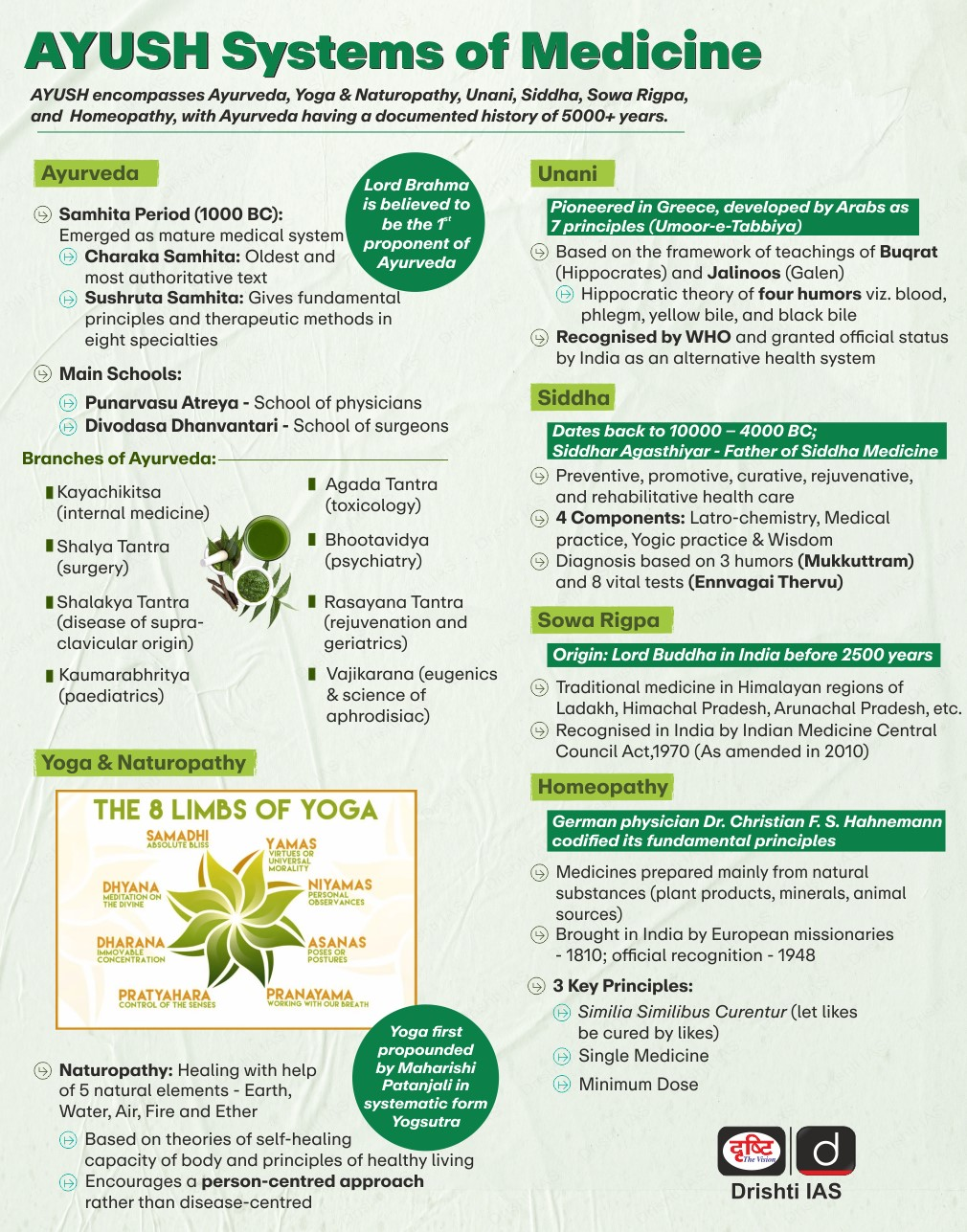Uttar Pradesh Switch to Hindi
Establishment of Ayurveda Institute in Varanasi
Why in News?
On National Ayurveda Day, the Uttar Pradesh government announced that a premier Ayurveda institute will be set up in Varanasi.
Key Points
- The government is establishing an Ayurveda institute in Varanasi, similar to AIIMS, to promote the research and development of Ayurveda and strengthen the traditional practice.
- The facility will span 10 acres, featuring educational and treatment amenities, including a medical college for Ayurveda and both indoor and outdoor patient care services.
- New Ayush dispensaries will also be established across the state with a budget of Rs 104 crore to meet growing demand.
- New Ayush medical colleges will also be established in key cities like Gonda, Basti, Mirzapur, Agra, and Meerut, focusing on higher studies and research in Ayurveda to promote traditional medicine nationwide.
National Ayurveda Day
- Ayurveda Day, first observed in 2016, was celebrated on 23 September this year, replacing the earlier practice of celebrating it on Dhanvantari Jayanti (Dhanteras).
- The theme for 2025 was "Ayurveda for People & Planet," emphasising global wellness and environmental sustainability through Ayurveda.
Uttar Pradesh Switch to Hindi
UP Leads in Ayushman Bharat-PMJAY Implementation
Why in News?
Uttar Pradesh leads in the implementation of the Ayushman Bharat scheme, covering 87% of eligible families, marking a milestone in universal health coverage.
Key Points
- About: In Uttar Pradesh, 87% of eligible families now possess an Ayushman card, with a total of 5.38 crore cards distributed, positioning the state at the forefront of the Ayushman Bharat scheme's implementation.
- Over 50% of the nine crore target beneficiaries in Uttar Pradesh have already been enrolled in the scheme.
- This milestone was highlighted during an event celebrating the seventh anniversary of the Ayushman Bharat Pradhan Mantri Jan Arogya Yojana (PMJAY).
- Healthcare Access and Expenditure: Since its inception, 74.4 lakh beneficiaries in Uttar Pradesh have received free treatment at empanelled hospitals under the scheme, totalling an expenditure of Rs 12,283 crore.
- Of this, Rs 4,200 crore has been allocated for tertiary care services like cancer treatment, cardiology, organ transplants, and pediatric oncology.
- Empanelled Hospitals: Currently, Uttar Pradesh boasts 6,099 empanelled hospitals, the highest in the country, including 2,921 government hospitals and 3,088 private hospitals. This extensive network ensures wide access to healthcare for the state’s population.
Ayushman Bharat-PMJAY Scheme
- Overview: Launched on 23rd September 2018, Ayushman Bharat is recognised as the world’s largest universal health coverage initiative, covering approximately 45% of India’s population.
- It aims to provide free and high-quality healthcare to economically disadvantaged families.
- Funding: It is a centrally sponsored scheme with a cost ratio of 60:40 for the Centre and states and 90:10 for the north-eastern states, Himalayan states and Union Territories. States have the option to opt out of the scheme.
- Target Beneficiaries: The beneficiaries are selected based on the Socio-Economic and Caste Census (SECC) 2011 and other state-specific initiatives.
- These include construction workers, Antyodaya cardholders, accredited journalists, ASHA and Anganwadi workers, Kumbh workers, senior citizens above 70 years, and vulnerable tribal groups. Recently, the scheme has also been extended to include teachers.
Uttar Pradesh Switch to Hindi
Scope of CM Housing Scheme (Rural) Expanded
Why in News?
The Uttar Pradesh government has expanded the Chief Minister’s Housing Scheme (Rural) to include marginalised OBC sub-castes, ensuring more inclusive housing benefits for rural populations.
Key Points
- About:
- Launched in 2018, the Chief Minister’s Rural Housing Scheme has been instrumental in providing shelter to homeless and economically backward families, including those affected by natural disasters, leprosy, Kala-azar, and disability.
- The scheme operates alongside the Pradhan Mantri Awas Yojana (PMAY-Gramin) but specifically covers those excluded from central housing initiatives.
- In 2024, the government included widowed women between the ages of 18 to 50 years in the priority list, recognising their vulnerability and need for special support.
- Expansion of Beneficiary List:
- The government has added the 'Sapera' and 'Jogi' sub-castes to the priority list of beneficiaries under the Chief Minister’s Housing Scheme (Rural).
- The 'Sapera' community, residing in Mathura, Prayagraj, and Saharanpur districts, and the 'Jogi' community, with approximately 200 families in the Maitha development block of Kanpur Dehat district, are now eligible for the scheme.
- Previously, the Chero tribe from Sonbhadra and Varanasi districts was also added to the priority list.
National Current Affairs Switch to Hindi
World Food India 2025
Why in News?
The Prime Minister will inaugurate the 4th edition of World Food India on 25th September 2025 in New Delhi, with over 90 countries, 2,000+ exhibitors, and thousands of stakeholders participating in the largest edition yet.
Key Points
- About: World Food India 2025, organised by the Ministry of Food Processing Industries from 25th to 28th September 2025, will highlight India’s potential as the ‘Global Food Hub’ for food processing and supply.
- India is the largest producer of milk, onions, and pulses, and the second-largest producer of rice, wheat, sugarcane, tea, fruits, vegetables, and eggs.
- The food processing sector has attracted USD 7.33 billion in FDI equity inflows over the past decade.
- Partner & Focus Countries: New Zealand and Saudi Arabia will participate as Partner Countries, while Japan, UAE, Vietnam, and Russia will participate as Focus Countries.
- International Events:
- 3rd Global Food Regulators Summit by Food Safety and Standards Authority of India (FSSAI)– providing a unique platform for global regulators to deliberate on harmonisation of food safety standards and strengthen international regulatory cooperation.
- 24th India International Seafood Show (IISS) by the Seafood Exporters Association of India (SEAI) – focusing on India’s growing seafood export potential and global market linkages.
- Core Focus Pillars:





 PCS Parikshan
PCS Parikshan



